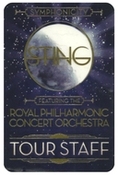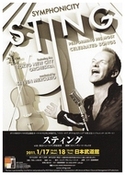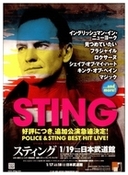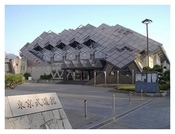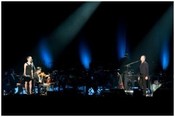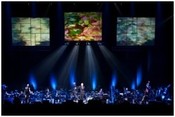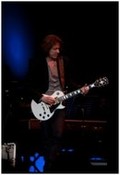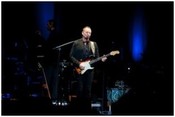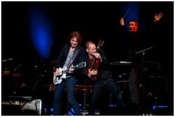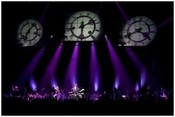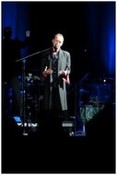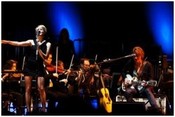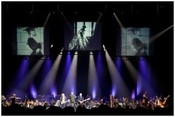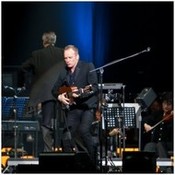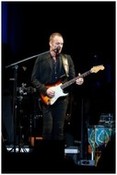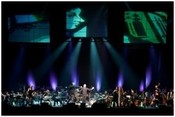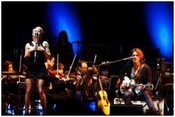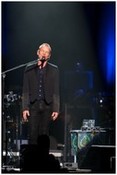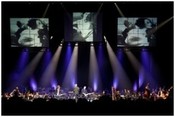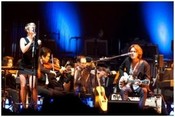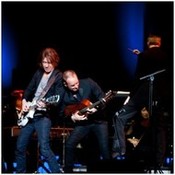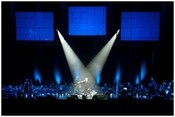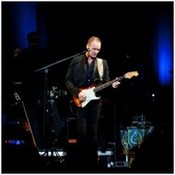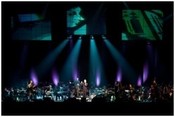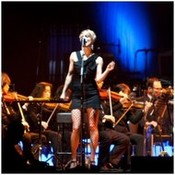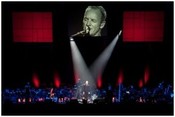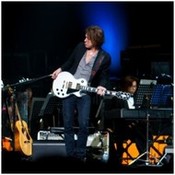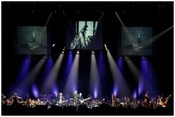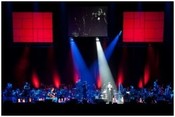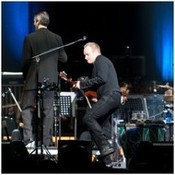
Sting @ Nippon Budokan...
In collaboration with the Royal Philharmonic Concert Orchestra, he produced the album "Symphonicity," a rearrangement of his signature songs from the past, including both his work with The Police and his solo work, and released it in August 2010. A world tour featuring Sting, band, and orchestra began in June 2010. The live album "Live in Berlin," featuring the September 21st performance in Berlin, was released on January 12th of this year. He came to Japan with a performance in Osaka and Nagoya, followed by a three-day show at Nippon Budokan in Tokyo. I saw the first day of the tour. The tour then travelled to North America, Europe, and Korea, before coming to Japan, where it will conclude with a total of 11 shows in Australia and New Zealand in January and February. By the way, in North America and Europe they toured with the Royal Philharmonic Concert Orchestra, and elsewhere they performed with the orchestras of their respective countries. In Japan they performed with the Tokyo New City Orchestra.
So, in addition to the album, a live album has also been released, the tour pamphlet has a list of songs that reads, "Tonight's set list will be performed from these songs," and the song titles were all listed on the advertising posters for this Japan tour, and I was given permission by the staff to write about it, so even though there are still two days left of the Tokyo performance, I'll write about the set list. If you don't want to know, please stop reading now.
The show was in two parts, with a 20-minute break between the first and second parts.
Part 1
1.If Ever Lose My Faith You
2.Every Little Thing She Does Is Magic
3.Englishman In New York
4.Roxanne
5.Straight To My Heart
6.When We Dance
7.Russians
8.I Hung My Head
9.Shape Of My Heart
10.Why Should I Cry For You?
11.Whenever I Say Your Name
12.Fields Of Gold
13.Next To You
Part 2
14.A Thousand Years
15.This Cowboy Song
16.Tomorrow We’ll See
17.MOON Over Vourbon Street
18.End Of The Game
19.You Will Be My Ain True Love
20.All Would Envy
21.Mad About You
22.King Of Pain
23.Every Breath You Take
encore 1
24.Desert Rose
encore 2
25.She’s Too Good For Me
26. Fragile
Encore 3
27. I Was Brought To My Senses
That's it. Needless to say, numbers 2, 4, 13, 22, and 23 are Police songs, and the rest are solo pieces. And one more thing, needless to say, "Symphonicity" is a play on the title of The Police's final album, "Synchronicity."
Then, for the very last song, number 27, Sting sang it alone a cappella. This song wasn't on the setlist given to us at the reception, so it seems he's been singing it alone every day, not knowing what he'll sing. Apparently, on some days during tours around the world so far, he's sung The Police's "Message in a Bottle" instead of "I Was Brought To My Senses." Aaaah! So, maybe today, the second day, or tomorrow, the third day, at Budokan. That's great.
At the back of the stage, the Tokyo New City Orchestra. It was a massive, full orchestra, including not only strings and brass instruments, but also timpani, marimba, and even a harp (not a blues harp, but a "lyre" harp). In front of the orchestra, spread out horizontally, were the members of Sting's band. Sting was at the front centre of the stage. Directly behind him was the conductor (not from Tokyo New City, but Stephen Mercurio, who has accompanied Sting on every leg of this tour).
Depending on the song, the performance would evolve into a duet between Sting and a female band member (an artist named JO LAWRY), or just Sting and an acoustic guitarist, or sometimes just the band and Sting, or conversely, the band would leave and it would just be the orchestra and Sting. Occasionally, a brass member from the orchestra would come forward to take a solo, and afterwards, Sting would introduce them by name, which I found quite impressive.
There were three screens above the stage. The footage included works by photographers and video artists who seemed to like Sting, shots of Sting and the orchestra on stage, and blank periods.
That was the kind of concert it was. So, Sting would sing, with an orchestra, rearranged songs that represent his entire career, both with the Police and his solo career. And then he'd go on a world tour. When I first heard about this project, where an artist with Sting's career, position, and presence was planning to do something like this, I honestly wasn't interested. It was a very obvious, "hyped" kind of thing. That was my honest reaction. However, since my long-cherished wish to see the Police reunite and come to Japan came true in February 2008 (see the live report here → http://ro69.jp/live/detail/113), I didn't really care what happened next, and no matter what Sting did after that, I was like, "Oh well, whatever." People like that shouldn't go see this. That's what I think, too. Basically, I was drawn in by the fact that they were also playing Police songs, so I went along.
It was amazing. The moment it started, I had to change my stance; it was so incredible. From the first song, it was clear that Sting and the band, mixing rock and classical music, were being performed not for fun but as a challenge. It was that kind of concert. It was clear that this orchestral collaboration wasn't about "adding classical elements" or "mixing it with classical music," but rather "trying this method of creating a new kind of pop music." Maybe this is more radical. Maybe this is more experimental. Maybe this is more pop. Every song was rearranged in that way, the instruments were played in that way, and the songs were sung in that way.
The performance itself, performed by Sting, band, and full orchestra, was incredibly thrilling. In this song I'm listening to now, I don't know what development awaits me next, or what expression the music will take. That unpredictability is present in every song, at every moment. I think part of it is the arrangement itself, but as I mentioned earlier, I think it's because they were performing with orchestras from each country, which means it was almost like a music session. So I imagine it was thrilling not only for the spectators, but also for the performers and singers.
And then there was Sting's singing, which was reflected in the music. It was clearly better than when The Police came to Japan three years earlier. His voice was coming out better, meaning he was in good condition. And his expressiveness has also improved in many ways, in terms of tempo, intonation, and pitch. Of course, I think the songs themselves were easier to sing, since they didn't have the same rushed beats and hectic chord changes as The Police.
So, it was a very radical concert. With a full orchestra on stage, the audience mostly made up of long-time fans over 40 (including me), and Sting singing sonorously at the age of 59 (he will be turning 60 in October this year), it was a typical sight, but I thought this would reach even the most current rock fans. You should definitely go see it now.
(c) rockinon.com by Hyogo Shinji
01172011
SET LIST
- If I Ever Lose My Faith In You
- Every Little Thing She Does Is Magic
- Englishman In New York
- Roxanne
- Straight To My Heart
- When We Dance
- Russians
- I Hung My Head
- Shape Of My Heart
- Why Should I Cry For You?
- Whenever I Say Your Name
- Fields Of Gold
- Next To You
- A Thousand Years
- This Cowboy Song
- Tomorrow We'll See
- End Of The Game
- You Will Be My Ain True Love
- All Would Envy
- Mad About You
- King Of Pain
- Every Breath You Take
- Desert Rose
- She's Too Good For Me
- Fragile
- I Was Brought To My Senses




